#teleny or the reverse of the medal
Explore tagged Tumblr posts
Text
teleny will always come back to haunt me
#reading about the gay pastoral and apparently teleny has got a bit about how gay love is all natural and such#and he finally understands why lovers would carve their initials on trees and nature imagery etc#teleny#teleny or the reverse of the medal
11 notes
·
View notes
Text
Obsessed with Teleny being attributed to Oscar Wilde despite the fact that he almost definitely didn't write it. Truly the peak of fake Oscar Wilde quotes, everyone just agreeing that he wrote a whole book that he didn't write.
#to be clear he was probably somewhat involved or at least the writer(s) were people he knew#but still#oscar wilde#teleny#teleny or the reverse of the medal
2 notes
·
View notes
Text
Gonna get teleny or the reverse of the medal in a few weeks and I'm angry about the fact I'm only gonna get it in a few weeks. Bitch give me the pornography NOW.
4 notes
·
View notes
Text
so i'm searching for the perfume Teleny could or could not have worn in The reverse of the medal, he says it's called "héliotrope blanc" and i've found 3 of this name released before the publication of the book (1893) : 1st is a 1850 by LT Piver, 2nd a 1880 by Guerlin, and 3rd a 1886 by OL Legrand, pls tell me what you think thank you ;-;
1 note
·
View note
Text
"i promised to give you guys the porn novel so its in your optional reading for this week"
#(its teleny or the reverse of the medal)#(the context is it being attributed to oscar wilde)#my post
2 notes
·
View notes
Note
(that last anon again) Thank you so much for the recommendations! I'm truly in awe of how well read you are and how thorough your answers are. May I ask if you have any fiction recommendations with the same themes?
(following on from this ask)
hi!! you're very kind, apologies for taking so long to get back to you! i've been snowed under with assignments+readings for uni and the slowly encroaching exam crawl... but yes absolutely♡
- The Story of O, Anne Desclos - The Bloody Chamber ; The Infernal Desire Machines of Doctor Hoffman ; The Passion of New Eve, Angela Carter -> Angela appreciated and referenced symbolist artists like Rops:
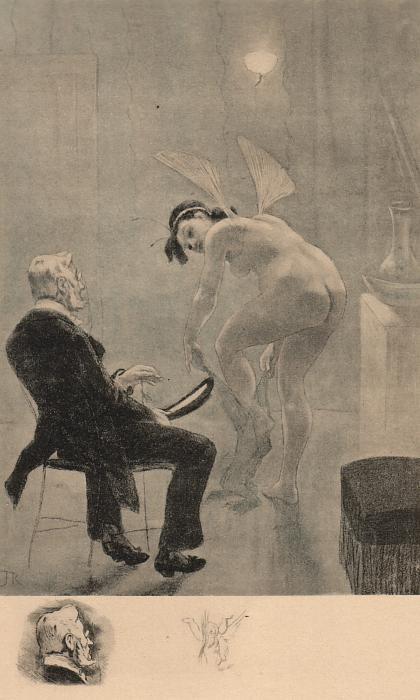
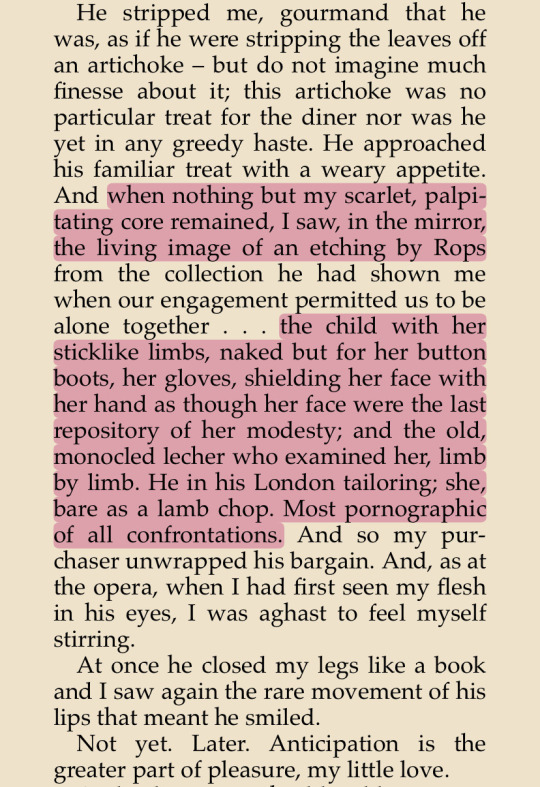

Woman Putting on Costume, 1848-1898, Rops; The Bloody Chamber, Angela Carter; excerpt from Romana Byrne's Aesthetic Sexuality: A Literary History of Sadomasochism (mentioned in previous ask) which seems esp pertinent given the Bloody Chamber is a Bluebeard tale (but which is actually referencing Story of O)
I also mentioned Giger in the previous ask, and Hans Bellmer was an influence of his whom I enjoy viewing alongside Rops...

this is Sans Titre (Jeune Fille et la Mort), 1963
- The Torture Garden, Octave Mirbeau
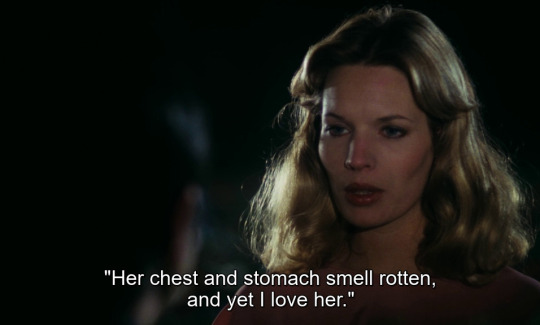
(Le Jardin des supplices (1976) dir. Christian Gion; screencap from estateofinsanity)
- Exquisite Corpse, Poppy Z. Brite - Necrophilia Variations, Supervert - Story of the Eye; My Mother, Madame Edwarda, The Dead Man; Blue of Noon, Bataille - Justine, or The Misfortunes of Virtue ; Juliette ; 120 Days of Sodom, Sade - The Claiming of Sleeping Beauty, Anne Rice -> supplement w Sleeping Beauty (2011) dir. Julia Leigh - Venus in Furs, Leopold von Sacher-Masoch - Monsieur Vénus, Rachilde - Le Necrophile, Gabrielle Wittkopp - The Apprenticeship of Big Toe P, Reiko Matsuura - The Damned ; Against Nature, Joris-Karl Huysmans - Empire of the Senseless, Kathy Acker - Crash, J.G. Ballard (+ the Cronenberg of course) - Salomé / Teleny, or the Reverse of the Medal, Oscar Wilde - La Morte Amoureuse, Théophile Gautier

^Romuald bitterly remembers his lost love, 1904, Eugène Decisy—his etchings for Gautier's story are beautiful (x, x)
- The Image, Jean de Berg - Trois Filles de leur mère, Pierre Louÿs - House of Incest, Anaïs Nin - My Dark Vanessa, Kate Elizabeth Russell - Naomi, Jun'ichirō Tanizaki - “Dolores”, Algernon Charles Swinburne:
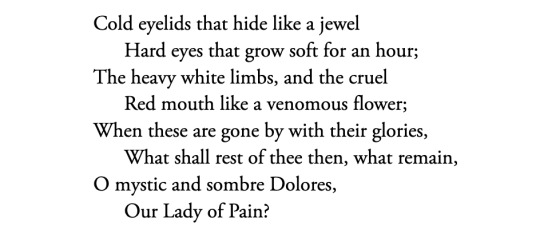
-> first of many stanzas^ ; I also like his “Laus Veneris” - Trouble Every Day (2001) dir. Claire Denis - Belladonna of Sadness (1963) dir. EIichi Yamamoto
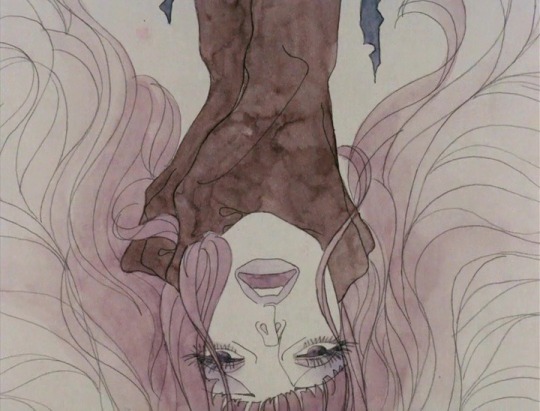
(screencap from eternal--return)
- Nekromantik (1988) dir. Jörg Buttgereit - Thirst (2009) dir. Park Chan-wook -> supplement w Zola's Thérèse Raquin and In Secret (2013) dir. Charlie Stratton
124 notes
·
View notes
Text
“I longed to feel that mighty love which maddens one to crime.”
Oscar Wilde, Teleny or the Reverse of Medal
4 notes
·
View notes
Photo

Teleny (or the reverse of the medal) by GhostWriter503
#digital art#drawing#gay#illustration#teleny#teleny or the reverse of the medal#victorian#gay literature#victorian literature#rene teleny#camille de grieux#victorian gays#art nouveau#art nouveau inspired#oscar wilde#literature#book#book cover
6 notes
·
View notes
Text
Teleny is such a motherfucker honestly.
#teleny#reverse of the medal#des grieux#oscar wilde#people cheating on their boyfriend with his mother
5 notes
·
View notes
Text
[Teleny][Oscar Wilde]
Tradotto qui per la prima volta in versione integrale a partire dalla prima edizione inglese del 1893, "Teleny" viene accompagnato dall’assolutamente inedito "Des Grieux – Preludio a Teleny”
«Dalla prima volta che lo vidi sentii che poteva immergersi profondamente nel mio cuore e, ogni volta che mi guardava sentivo tutto il sangue ribollirmi nelle vene». Così comincia la magnetica attrazione sensuale e mistica tra Camille Des Grieux e René Teleny, il loro amore folle che spinge al crimine, l’ardore della carne che, rispondendo al richiamo della «forza della natura», spinge sentimento…

View On WordPress
#2022#fiction#Matteo Pinna#Narrativa#or The Reverse of the Medal#Oscar Wilde#Paola Biandolino#Teleny#UK#WoM Edizioni
0 notes
Text
much as Teleny is a weird little book, you have to admit this part is quite good and still relatable as a description of first love:
''Far from being ashamed of my crime [having gay sex with Teleny], I felt that I should like to proclaim it to the world. For the first time in my life I understood that lovers could be so foolish as to entwine their initials together. I felt like carving his name on the bark of trees, that the birds seeing it might twitter it from morn till eventide: that the breeze might lisp it to the rustling leaves of the forest. I wished to write it on the shingle of the beach, that the ocean itself might know of my love for him, and murmur it everlastingly.'' ''Still I had thought that on the morrow—the intoxication passed—you would have shuddered at the thought of having a man for a lover?'' ''Why? Had I committed a crime against nature when my own nature found peace and happiness thereby? If I was thus, surely it was the fault of my blood, not myself. Who had planted nettles in my garden? Not I. They had grown there unawares, from my very childhood.'' (2010 edition, p.107)
(Teleny is a gay pornographic novel published in 1893 about ''the magnetic attraction and passionate though ultimately tragic affair between a young Frenchman named Camille Des Grieux and the Hungarian pianist René Teleny'' and it's said Oscar Wilde had a hand in writing it)
#i don't remember anything else but the bottle scene and that he was in a cab outside teleny's house and telepathically saw him having sex#with a woman inside or something lol i wouldn't recommend it as a novel though i would as something of historical interest i suppose#this was quoted in an article i read about the gay pastoral lol i don't want to reread teleny. it wasn't very good. don't be fooled by this#teleny#teleny or the reverse of the medal#oscar wilde but maybe not
7 notes
·
View notes
Text
LGBT literature of the 1860s–1910s. Part 4
Well, it’s been a while. Here’s a new selection featuring three stories about love between students, lesbian poems, a comedy centered around a gay character, Proust's short story, and more
1. Bertram Cope’s Year, by Henry Blake Fuller (1919). Although this novel went unnoticed by its contemporaries, it is thought to be the first officially published American novel about homosexual men. It could be your perfect academia novel: Bertram, “no squire of dames”, is a self-conscious English teaching assistant at an Illinois university where he completes his thesis and tries to settle in life. Four women and three men are attracted to him, but Bertram is fond of “Dear Arthur”, his college friend Arthur Lemoyne who comes to live with him later. Interestingly, the story has a touch of comic and ironic, which was very rare for homosexual literature of that time. [Read online]
2. Le Monsieur Aux Chrysanthèmes (The Gentleman of Chrysanthemums), by Armory (Carle Dauriac; 1908). This is the first modern play (and a society comedy at that) that has a gay man as its main character. The character is Gill Norvège, a critic and writer, who uses a young widow Marthe Bourdon to get money. Marthe is hopelessly in love with Gill and borrows 30,000 francs from a poet Jacques Romagne, who, in turn, is hopelessly in love with Marthe. And then Gill sees Jacques one day and falls in love with him. [Read online in French or in English]
3. The Garden God: A Tale of Two Boys, by Forrest Reid (1905). Called “a classic of Uranian literature”, this story has it all: homoerotism, platonism, ancient gods and love at boarding school. In that school a fifteen years old Graham, who used to dream of friendship with a Greek god, meets Harold who looks exactly like that imaginary friend. But where there are gods there is also tragedy, so be prepared. [Read online]
4. Poems by Sofia Parnok. Parnok was the first open lesbian in Russian literature. She was in a relationship with another famous Russian poet, Marina Tsvetaeva, as well as with some other women to whom she dedicated a number of poems. Often called the Russian Sappho, she often refers to Sappho in her poetry and also used her famous phrase, “Someone, I tell you, in another time will remember us”. Some of Parnok’s poems are translated and more is available in Russian.
5. Teleny, or The Reverse of the Medal (1893). Not the first, but one of the earliest examples of English-language homosexual erotic novels (though rather sophisticated), its author is unknown, but some believe that it was written by Oscar Wilde. Here we have a tragedy again, a tragic love between a Frenchman and a Hungarian pianist, to be exact. There’s also something literally queer going on, because the Frenchman, Des Grieux, has a telepathic connection with the attractive pianist, Teleny. Eventually they meet, and Teleny introduces Des Grieux to the underground homosexual world of Paris. Bonus: the novel has a comic adaptation, Teleny and Camille, by Jay Macy, and also a “prequel”, Des Grieux, written in 1899. [Read online]
6. Anders als die Andern (Different from the Others), by Bill Forster (Hermann Breuer; 1904). The title is supposedly derived from a phrase that was popular among German gay men of that time, “We are, thank god, other than other people”. Herbert, the protagonist, falls in love with Ernst, the boy from his school. They go hiking together, and for some time they are close. But Ernst, although flattered by Herbert’s attention and feelings, rejects him twice, and it destroys Herbert’s life.
7. Avant la nuit (Before dark)by Marcel Proust (1893). A forgotten short story by Proust, written when he was only 22, despite what you might expect, tells about a lesbian woman. She is incredibly unhappy: she is in a relationship with a man, but wants to confess her true sexuality and suffers from her own dishonesty. Finally, she tells him the truth and asks for his compassion. In a way, this story defends homosexuality and explains why it cannot be condemned. [Read online]
8. The Prussian Officer, by D. H. Lawrence (1914). Praised as a masterpiece of short fiction by some critics, this story is rather grim. A captain slowly becomes attracted to his young, simple orderly. However, he represses his feelings and, instead of showing any kind of affection, turns aggressive and humiliates the young man. And it is not going to end well. [Read online]
9. Quelques Portraits-Sonnets de Femmes (Some Portrait-Sonnets of Women), by Natalie Clifford Barney (1900). One of the most famous lesbian poets of the 20th century, Barney wrote a chapbook of love poems to women that were so scandalous her father bought up all remaining copies and burned them. Two novels based on or about women’s affairs with Barney were also featured in previous chapters of this list. The book is not available online, but some poems can be found in English here and here.
10. The Intersexes: A History of Similisexualism as a Problem in Social Life, by Edward Prime-Stevenson (1906). Prime-Stevenson didn’t just write the first novel about gay men with a happy ending (featured in the previous part of the list), but also an interesting study, one of the earliest ones. Using science and history, he defenses homosexuality, which is why he is considered to be one of the first advocates for the rights of the LGBTQ community. A very progressive work for his time, it rejects the binary of masculine and feminine and insists that homosexuality is a natural result of human evolution. [Read online]
P.s. Previous parts are collected here.
#lgbt literature#queer history#dark academia#lesbian literature#oscar wilde#russian literature#natalie clifford barney#marcel proust#lgbt history#gay literature#lesbian history#gay history#victorian era#blog: history#blog: literature
386 notes
·
View notes
Text
About CCaTH chapter 28-30
Some additional information:
The London Zoo really did acquire a new elephant with her little calf in 1851, which they hoped would turn out to be a sensation equal to Obaysch the year before – but I found no record of whether their hopes actually came true.
Spencer House is located right at Green Park corner, merely a few houses down from where the fictional Minerva House is located. The Earl and Countess (the ancestors of Lady Diana, btw) really were famous for their large social gatherings, and Queen Victoria visited them frequently in the 1830s. The Countess died in 1851, so depending on when exactly she died (I couldn’t find a specific date) there would not have been a ball due to the family being in mourning.
Hollywell Street, where Kurt sometimes collects books for Sebastian, was notorious for its many bookshops selling pornography. The street was later torn down and integrated into the larger Strand.
The Great Exhibition was the pet project of Prince Albert. It took place in the (specially built for this occasion) Crystal Palace in Hyde Park from 1 May to 15 October 1851, and showcased thousands of exhibits from Britain, its colonies and other countries. The money earned by selling tickets was used, among other things, to built the Natural History Museum and the Victoria & Albert Museum in London, which today are admission free.
The Great Exhibition was, in many ways, symbolic for the Victorian age – not merely in showcasing the century’s technological progress, but – from a modern perspective – also by bringing to light the dark undertones of Englishness and Victorian identity including nationalism, colonialism and imperialism and racism.
Next to that, another problematic aspect of the era was the increasing criminalization of homosexuality (male, only, cause nobody could imagine women to have something like a sexuality), which culminated in the public humiliating trial and incarceration of Oscar Wilde towards the end of the century. Which is why I found it so important to make not just Kurt’s and Sebastian’s relationship, but the history of LGBTQ identity an integral part of the Exhibition that has become synonymous with the Victorian era. And I felt using the story of Antinous is what Oscar Wilde would have wanted, since he makes sure to mention it (as code for gay, gay, supergay) in many of his works: in The Picture of Dorian Gray, the fairytale “The Young King” and the – rumoured to be authored by him – pornographic work Teleny: Or The Reverse of the Medal.
2 notes
·
View notes
Photo

Teleny, or the Reverse of the Medal is a book with no verified authors, however, it is rumored (and widely thought) that the book was created through the compiled works of various men close to Oscar Wilde, or at least associated with the queer culture existing in London. Sometimes Teleny is attributed to Wilde as the editor and compiler of the work, although none of this can be proven.
The book was published in 1893 by Leonard Smithers. It is considered an early example of pornography in the English language, focused on homosexuality. Although explicit, the prose style, lyricism, and poetic style of the novel is Romantic and draws heavily from themes present in the Aesthetic movement. This is most likely the reason why many attribute its authorship to people within the Aestheticism movement, like Oscar Wilde himself and his friends.
This is an important work, if not just to be enjoyed at face value as entertainment, but to show as an example of how gay men in Victorian England were finding ways to express themselves. Much of it was through artistic pursuits (linking them to the Aestheticism movement) and largely it was through literary pursuits, like Oscar Wilde’s work.
The beginning of Teleny focuses on concert pianist, Rene Teleny, and his lover, Camille Des Grieux. The book opens with Des Grieux describing how he feels about Teleny to a friend of his.

The setting is that of two friends set to gossiping about their lives. It is a very familiar setting but the focus being on a homosexual experience is what sets this novel apart from other stories.
Des Grieux attends a concert in which he sees Teleny perform. While Teleny is performing, the two men share eye contact, and their intense attraction to one another results in Teleny having the best performance of his career. In turn, Des Grieux is sexually aroused as he watches the performance. The text even suggests he begins to masturbate while he watches Teleny perform.

The portion above is an excerpt from the first chapter in which Des Grieux is masturbating at Teleny’s concert. It is pornography written in flowery hand. The intensity in which Des Grieux feels attracted to Teleny without having even spoken to him yet is demonstrated in a beautiful romantic prose, through the idea of plain physical attraction.
Below is another passage in which Des Grieux explains how first came into physical contact with Teleny, his attraction to him validated by Teleny’s outward displays of affection. Again, it is explicit but it is also romantic. There is a beauty to how the novel is written.

The rest of the story revolves around: Des Grieux’s struggles with his sexuality, a suicide attempt that is stopped by Teleny, their ensuing sexual relationship and declarations of love, and dramatic tales of how Des Grieux and Teleny’s lives together unfold. Their story is not a happy story, as many stories involving queer characters are. Teleny commits suicide after Des Grieux discovers that he betrayed him by trading sex for money with Des Grieux’s mother. The public finds out and Des Grieux is socially disgraced.
The social “fall from grace” makes one think about the public spectacle and ensuing trial of Oscar Wilde.
Teleny is a fantastic look into how homosexual men in Victorian England were engaging with one another through the ways of Aestheticism. Their porn and erotica is beautifully written, dramatic, and worthy of a serious read. It also gives insight into what men in Oscar Wilde’s circle might have been feeling about themselves (Des Grieux’s inability to come to terms with his love for men), their anxieties (having their sexuality exposed), and their hopes (having a deep romantic relationship with a man).
There is also a modern-day comparison to be made here. Teleny, a novel written by queer individuals, most likely sharing stories with one another in an attempt to see themselves in literature and have fun writing, is very similar to fan culture nowadays and how people create fan fiction. Much fan fiction on the internet is LGBTQ+ fiction, written by LGBTQ+ individuals who struggle to see themselves represented in modern media. So they turn to their own talents and to their own communities and create works of art for themselves.
4 notes
·
View notes
Text

Hello there,
This is my first post on Tumblr, so I thought I’d start by introducing you to the main character of my current project, Teleny—a romance simulator inspired by the victorian novel The Reverse of the Medal.
Meet Camille des Grieux. He’s a shy young man who has spent his adult life keeping his desires hidden, completely in the closet at the beginning of the game.
I knew early on in his development that I wanted to create an outfit that reflected this aspect of his personality, not just for the intimate moments but more importantly for the everyday ones. Camille usually dresses in a rather modest outfit, complete with gloves and a scarf, and he only starts to shed these layers in situations where he feels safe and protected.
In addition to the main artwork, I’m also sharing a younger version of Camille. His character changes after his father leaves the family, and you can see that his childhood self carries a tad bit more carefree energy compared to his later years.
If you’re interested in learning more about Teleny, you can find more information right here:
#Teleny#Yaoi art#romance simulator#victorian#character design#indie game#gamedev#lgbtq#illustration#oscarwilde#gay#oc art
6 notes
·
View notes
Text
~"Teleny, or "The Reverse of the Medal" published 1893
horny frenchman voice: tonight I will be jacqueing off to a porneaux
44K notes
·
View notes